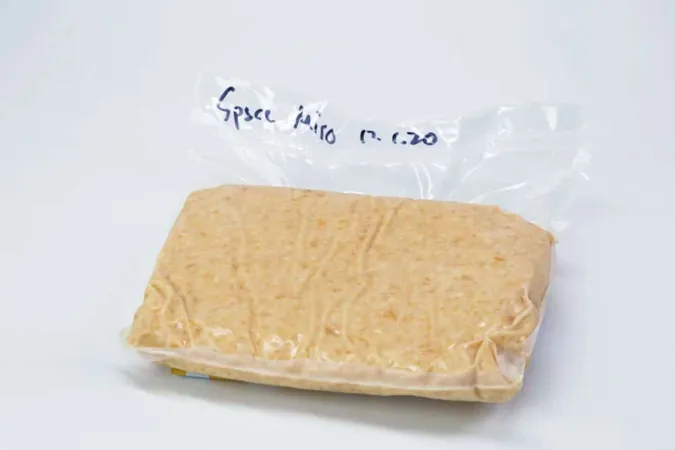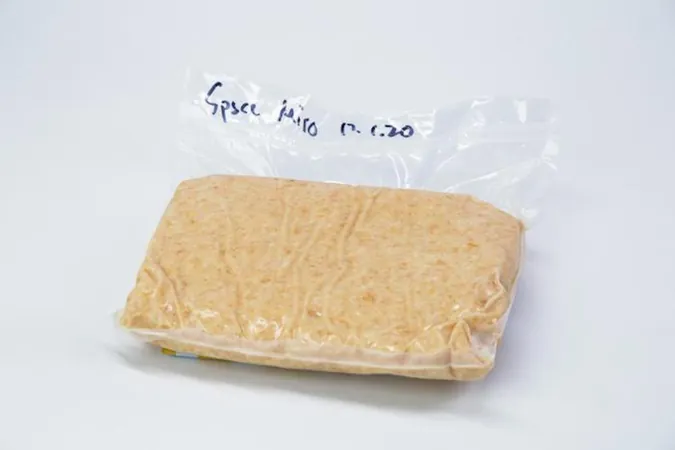
Groundbreaking Discovery: Miso Fermented in Space Unlocks New Culinary Horizons
2025-04-04
Author: Ken Lee
Groundbreaking Discovery: Miso Fermented in Space Unlocks New Culinary Horizons
In a remarkable leap for culinary science, Japanese miso paste has made its debut in the cosmos. For the very first time, scientists have successfully fermented miso aboard the International Space Station (ISS), marking a historic milestone in the realm of space food.
This groundbreaking experiment not only paves the way for improved nutrition for astronauts but also provides vital insights into how microorganisms adapt to the unique conditions of outer space.
An Out-of-This-World Umami Experience
Led by Maggie Coblentz of the Massachusetts Institute of Technology (MIT) and Joshua Evans of the Technical University of Denmark, the research team sent a small container of cooked soybeans to the ISS in March 2020. After a month of fermentation in space, the resulting miso was returned to Earth, and researchers were astonished to discover that it boasted a flavor profile distinctly different from its terrestrial counterparts. While it maintained the familiar umami taste, it also featured an intensified roasted and nutty flavor that set it apart.
A Study of Space's Impact on Fermentation
To delve deeper into this transformation, the space-fermented miso was compared with two batches produced under normal Earth conditions, one in Cambridge and another in Copenhagen. The findings highlighted fascinating contrasts. "The space miso was darker and appeared more agitated due to its travels in zero gravity," noted Evans. "Tasting that first bite was incredibly exhilarating."
The researchers speculate that the unique taste and texture may be attributed to the microgravity environment and the increased radiation levels present aboard the ISS.
Where Science, Flavor, and Culture Converge
This meticulously designed experiment used advanced sensors to monitor temperature, humidity, pressure, and radiation throughout the fermentation process. However, the researchers aimed to achieve more than a straightforward biochemical study. Their goal was to explore how flavor chemistry and microbiology intermingle with cultural significance in extraterrestrial contexts. "By merging microbiology, flavor science, and social considerations, our research points to new possibilities for understanding how life evolves when it ventures beyond Earth," stated Evans.
Boosting Astronaut Health and Happiness
Miso, a staple in traditional Japanese cuisine, is made using koji mold and undergoes a long fermentation period, producing both intricate flavors and numerous potential health benefits. Fermented foods, including miso, are celebrated for their probiotic properties that promote gut health and digestive balance. The research team is currently investigating whether space-made miso retains these essential nutritional characteristics.
The Culinary Frontier in Space Exploration
Broadened dietary options for astronauts go beyond mere sustenance; they significantly enhance morale, cultural identity, and the overall experience of space travel. The findings published in the journal iScience suggest that integrating diverse foods into astronaut diets could "enhance astronaut well-being and performance," says Evans. "It also opens the door for new culinary expression, enriching the cultural landscape of space exploration."
Additionally, Coblentz sees the successful fermentation of miso in outer space as a powerful indication that microbial ecosystems can adapt and thrive beyond our planet. This insight sparks hope for sustaining life during deep-space missions in the future.
With this pioneering research, the universe of culinary possibilities expands, promising a future where the flavors of Earth can continue to nourish those exploring the final frontier!




 Brasil (PT)
Brasil (PT)
 Canada (EN)
Canada (EN)
 Chile (ES)
Chile (ES)
 Česko (CS)
Česko (CS)
 대한민국 (KO)
대한민국 (KO)
 España (ES)
España (ES)
 France (FR)
France (FR)
 Hong Kong (EN)
Hong Kong (EN)
 Italia (IT)
Italia (IT)
 日本 (JA)
日本 (JA)
 Magyarország (HU)
Magyarország (HU)
 Norge (NO)
Norge (NO)
 Polska (PL)
Polska (PL)
 Schweiz (DE)
Schweiz (DE)
 Singapore (EN)
Singapore (EN)
 Sverige (SV)
Sverige (SV)
 Suomi (FI)
Suomi (FI)
 Türkiye (TR)
Türkiye (TR)
 الإمارات العربية المتحدة (AR)
الإمارات العربية المتحدة (AR)